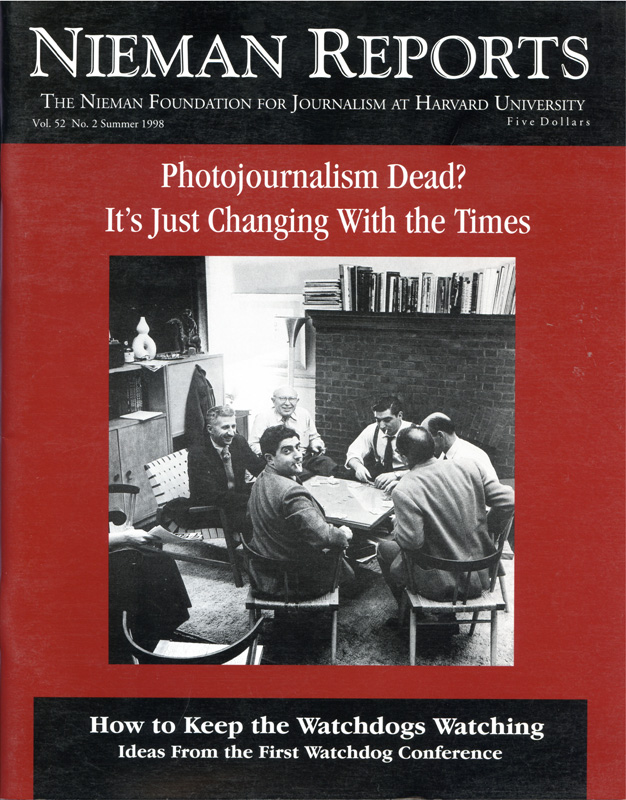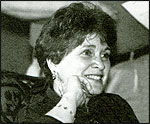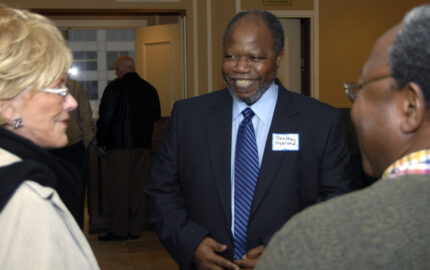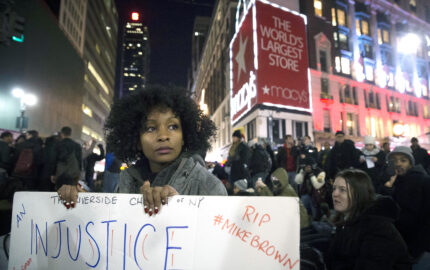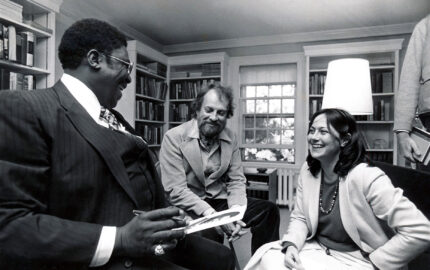Carole Kneeland was a seasoned reporter when she arrived as news director at KVUE-TV in Austin nine years ago. But she didn’t have a day’s worth of newsroom management experience. Still, within months, Carole had a dramatic and positive effect on the newsroom that, over the years, would become known nationally as a model of excellence.
Carole shaped a culture that encourages innovation and values individual employees. She emphasized quality over speed, people over product, and democracy over monarchy in the newsroom. She established a philosophical underpinning for the newsroom that empowers everyone with significant responsibility and enables the news director to pay attention to the big picture. And she did all that in the midst of surgery and chemotherapy for breast cancer diagnosed six months after she took the job.
Carole died on January 26. A small group of her colleagues and friends, including her husband, David McNeely, a 1976 Nieman Fellow, has established a fund to honor her innovative and compassionate work. The Carole Kneeland Project for Responsible Television Journalism will provide continuing education for television journalists, especially in management and ethics. The nonprofit, educational foundation is administered through the Texas Association of Broadcasters. The Kneeland Project’s first conference is scheduled for October 1-4 in Austin.
I spoke with Carole a month before she died. Here, in her words, are excerpts from that conversation:
“I established a team system for much of the major work of the newsroom: teams for hiring each new person, teams for designing and building the new newsroom, teams for critiquing our own work, for building the news set, creating our new weather radar system, even for setting the budget. It takes longer to do work with teams than it does with the conventional boss-down method, but you get buy-in from people you wouldn’t otherwise, you cover more bases, and there are fewer surprises.
“We assign a buddy, who was not a part of the hiring team, to each new employee. The buddy takes them around, makes introductions and shows them the ropes. So instead of the news director being the only person invested in the new hire’s success, you have a buddy and a hiring team on your side, making sure you succeed.
“Training is constant and everyone gets it. Our goal is to have at least one group training opportunity for everyone each quarter and for each person to have individual training, away from the station, once each year. That includes the newsroom secretary.
“But the training doesn’t amount to much if you don’t give people the chance to try what they’ve learned. So we’ve created a culture where taking risks is the norm. We celebrate both success and failure to encourage people to try new things. Two got national attention: our “truth tests” for political commercials and our criteria for crime coverage.
“Most stations ignore politics until election night. They don’t cover the races leading up to the election in ways that really help voters. So we decided to test the political ads on our air for truthfulness. Dozens of TV stations and newspapers followed our lead on this project. We were the first. And we took another big risk when we established criteria to apply to every crime before we report it. We’re known for that in Austin now and we have the top ratings by far. This approach can work.
“I want our ethical standards to remain high. We tell our people to make sure they take the high ethical road. So if they’re on the street and must make a judgment call about whether to move the camera closer to a grieving family, they know they won’t be penalized for exercising restraint.
“We were number two on some newscasts and on a downward slide when we started doing all these things in 1989. Ratings slowly started to turn around, until we became a solid number one in 1995. But ratings were not my motivation. It’s really a matter of doing the right thing, treating people well. You expect the best and you get the best. We dole out a lot of responsibility and we get a lot of good work in return.”
Valerie Hyman, Director of the Program for Broadcast Journalists at the Poynter Institute, is a 1987 Nieman Fellow. This article was adapted from the Winter edition of “Poynter Report.”
Carole shaped a culture that encourages innovation and values individual employees. She emphasized quality over speed, people over product, and democracy over monarchy in the newsroom. She established a philosophical underpinning for the newsroom that empowers everyone with significant responsibility and enables the news director to pay attention to the big picture. And she did all that in the midst of surgery and chemotherapy for breast cancer diagnosed six months after she took the job.
Carole died on January 26. A small group of her colleagues and friends, including her husband, David McNeely, a 1976 Nieman Fellow, has established a fund to honor her innovative and compassionate work. The Carole Kneeland Project for Responsible Television Journalism will provide continuing education for television journalists, especially in management and ethics. The nonprofit, educational foundation is administered through the Texas Association of Broadcasters. The Kneeland Project’s first conference is scheduled for October 1-4 in Austin.
I spoke with Carole a month before she died. Here, in her words, are excerpts from that conversation:
“I established a team system for much of the major work of the newsroom: teams for hiring each new person, teams for designing and building the new newsroom, teams for critiquing our own work, for building the news set, creating our new weather radar system, even for setting the budget. It takes longer to do work with teams than it does with the conventional boss-down method, but you get buy-in from people you wouldn’t otherwise, you cover more bases, and there are fewer surprises.
“We assign a buddy, who was not a part of the hiring team, to each new employee. The buddy takes them around, makes introductions and shows them the ropes. So instead of the news director being the only person invested in the new hire’s success, you have a buddy and a hiring team on your side, making sure you succeed.
“Training is constant and everyone gets it. Our goal is to have at least one group training opportunity for everyone each quarter and for each person to have individual training, away from the station, once each year. That includes the newsroom secretary.
“But the training doesn’t amount to much if you don’t give people the chance to try what they’ve learned. So we’ve created a culture where taking risks is the norm. We celebrate both success and failure to encourage people to try new things. Two got national attention: our “truth tests” for political commercials and our criteria for crime coverage.
“Most stations ignore politics until election night. They don’t cover the races leading up to the election in ways that really help voters. So we decided to test the political ads on our air for truthfulness. Dozens of TV stations and newspapers followed our lead on this project. We were the first. And we took another big risk when we established criteria to apply to every crime before we report it. We’re known for that in Austin now and we have the top ratings by far. This approach can work.
“I want our ethical standards to remain high. We tell our people to make sure they take the high ethical road. So if they’re on the street and must make a judgment call about whether to move the camera closer to a grieving family, they know they won’t be penalized for exercising restraint.
“We were number two on some newscasts and on a downward slide when we started doing all these things in 1989. Ratings slowly started to turn around, until we became a solid number one in 1995. But ratings were not my motivation. It’s really a matter of doing the right thing, treating people well. You expect the best and you get the best. We dole out a lot of responsibility and we get a lot of good work in return.”
Valerie Hyman, Director of the Program for Broadcast Journalists at the Poynter Institute, is a 1987 Nieman Fellow. This article was adapted from the Winter edition of “Poynter Report.”
